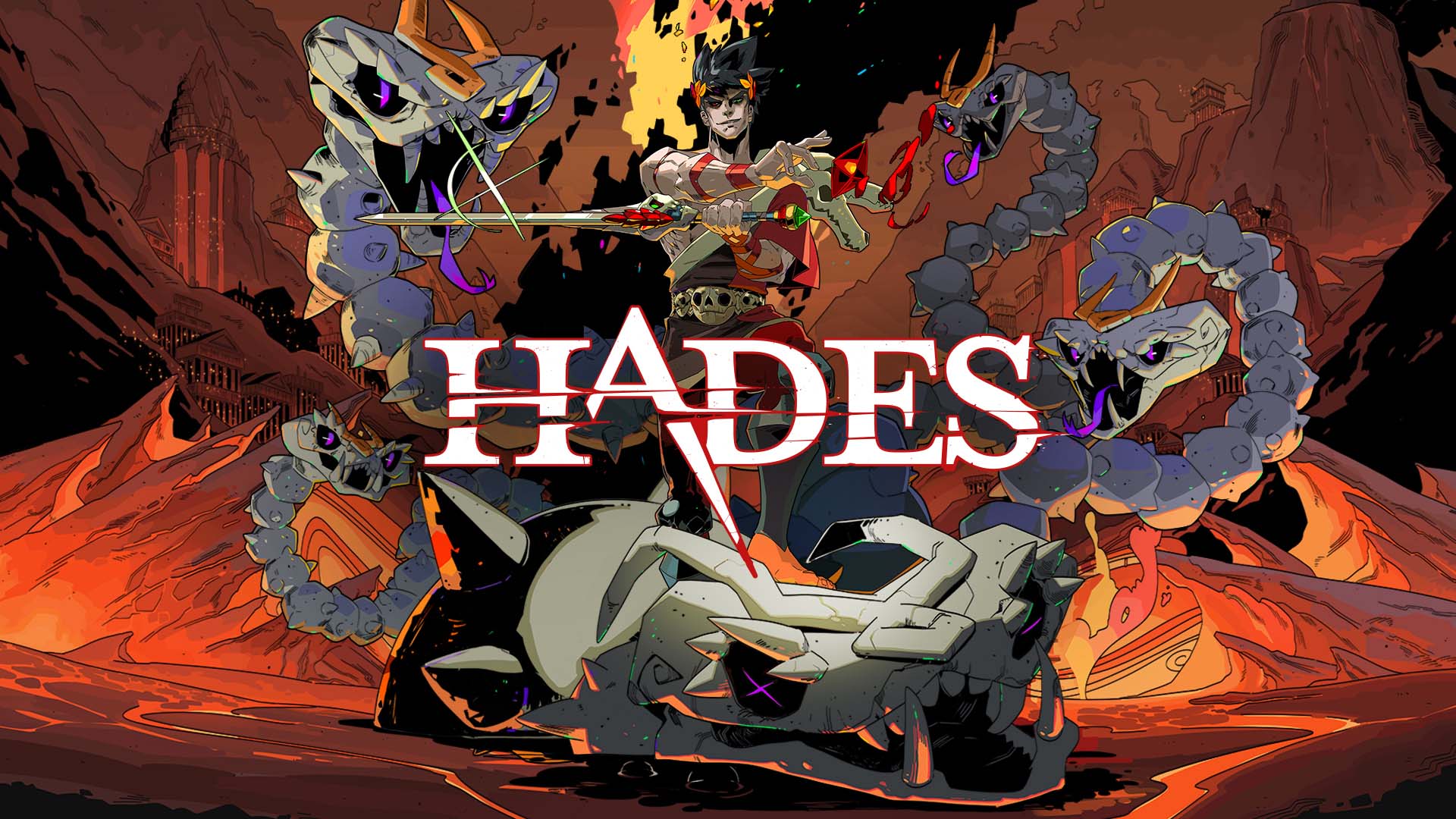
Supergiant Games’ titles have always stood out thanks to their indelible art direction. In my opinion the games themselves ranged from subpar to average, due to sloppily designed gameplay. From the intensely repetitive Pyre to the utterly broken and incomprehensible Transistor, Supergiant Games have managed to get by thanks to their style over substance.
Finally, Supergiant Games have struck gold with an ingenious formula and careful balancing act with Hades. This is a mixture of fast paced arcade-style action and rogue gameplay, with a brilliantly witty and gorgeous Greek myth tapestry.
How did they do it? There are so many small but clever touches through out that make Hades more than the sum of its parts. The careful integration of the narrative into the rogue mechanics. A cast of likeable characters. Balanced gameplay progression that is drip-fed at a brisk pace; it all makes Hades very hard to put down and very addictive.
Hades
Developer: Supergiant Games
Publisher: Supergiant Games
Platforms: Windows PC, Nintendo Switch (reviewed)
Release Date: September 17, 2020
Players: 1
Price: $24.99
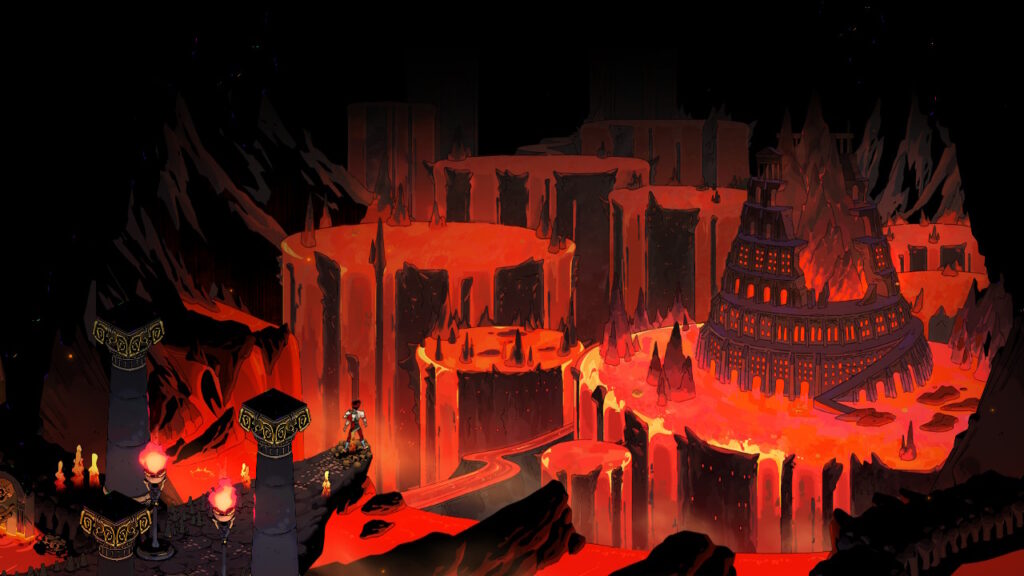
Zagreus is a Greek god of being a smartass. Unsatisfied with living in the underworld, he defies his father- Hades- and seeks to join the cooler Gods in Olympus. Zagreus wants to be hardcore, but his father won’t let him.
Hades’ dominion is an ever-shifting labyrinth of titans, gorgons, and weird monsters. Nobody can leave, and Hades does not even bother to stop his son from escaping every day. His perfect system will eventually kill his son, making him resurrect in the House of Hades.
Hades is so confident in his realm, he sits at a desk doing paperwork, mocking his son’s futile attempts. The only time he ever bothers to get up from his chair, is when Zagreus is close to the end, and is willing to throw down to stop him. Zagreus won’t be able to defy his father without help; other Greek Gods and heroes are willing to lend a hand too.
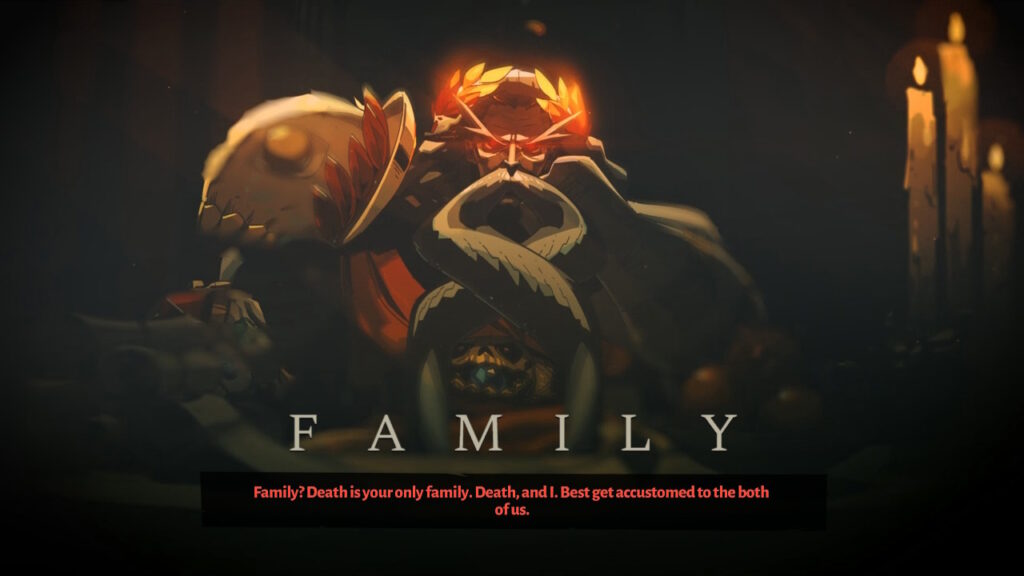
Gameplay in Hades is that of an overhead action game. Zagreus is able to equip six different types of infernal arms, and each one has its own unique move-set and special attack. He also has a spell casting ability, and is able to dash for evasive maneuvers.
Zagreus controls very tightly and responsively. Hades on Switch runs quite smoothly, and is a crisp 60 frames per second action game. You’re going to need every frame too, because the action and incalculable amount of bullets and hazards on screen can be overwhelming.
Using each of the infernal arms comes with their benefits and draw-backs. The sword is all-around useful for most situations, and has a powerful area-of-effect special attack for surrounding threats. The spear has slightly longer reach, but attacks in a line which demands more skillful and strategic use.
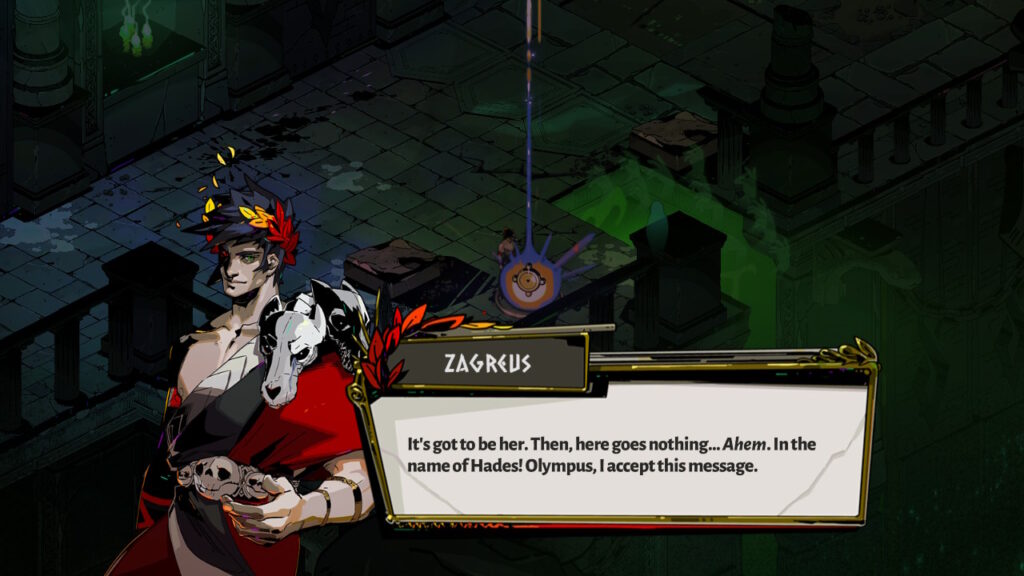
The shield is a very useful and effective weapon with fat range, and can be thrown. It also is the only weapon that can defend Zagreus, which gives it some added versatility.
The rifle and grenade launcher combo have effective reach, and can cause splash damage. The draw-back is its low power, and that having to reload will leave Zagreus vulnerable.
The gauntlets will let Zagreus throw fast punches like The Fist of the North Star, and has a powerful uppercut. The lack of reach will be troublesome in rooms full of witches who fill the room full of bullets, but with the right Godly gifts and boons (more on that later), even punches can reach as far as an arrow.
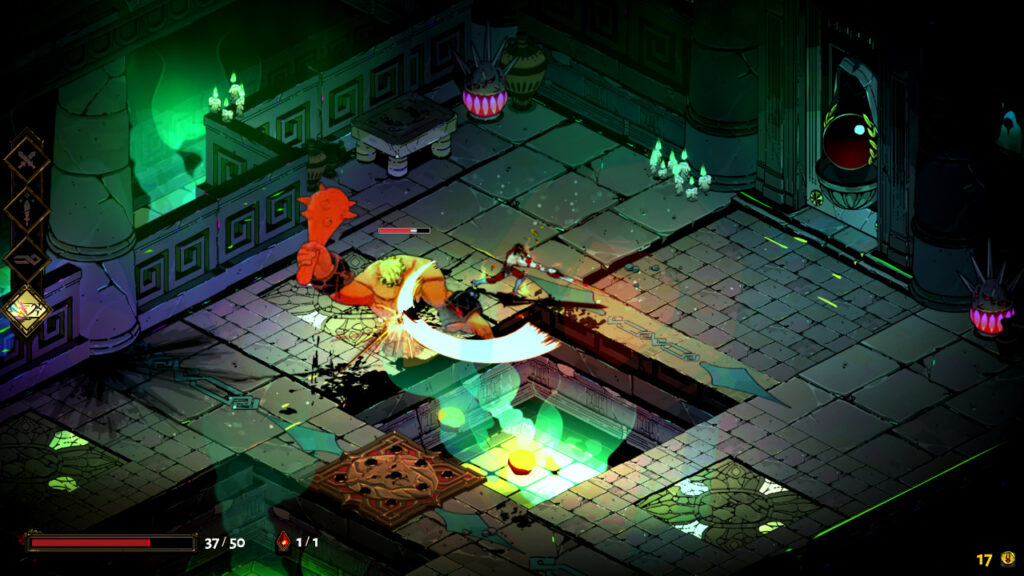
Hades’ gameplay relies heavily on the innumerous random upgrades and modifications Zagreus can pick up after every battle. He is often given options, and choosing one will lock others out until they randomly show up again. These are how to make even the seemingly useless bow and arrows into a deadly nuke that can raze an entire battlefield.
Some Gods grant passive abilities that can stack upon others, while sometimes they will offer useful abilities like Athena’s mods which can deflect attacks. Deflection is easily one of the most useful and satisfying to use, but applying the mod is limited to one attack at a time. You’ll have to choose if you want to deflect with either basic attacks or dashing, for example.
No matter what, the choices to make for upgrading are substantial and are helpful. The game is constantly introducing new concepts, and combinations that makes each run interesting and addictive. No matter how many times Zagreus falls, starting back at the house rarely feels punishing, because every time you feel like you learned something.
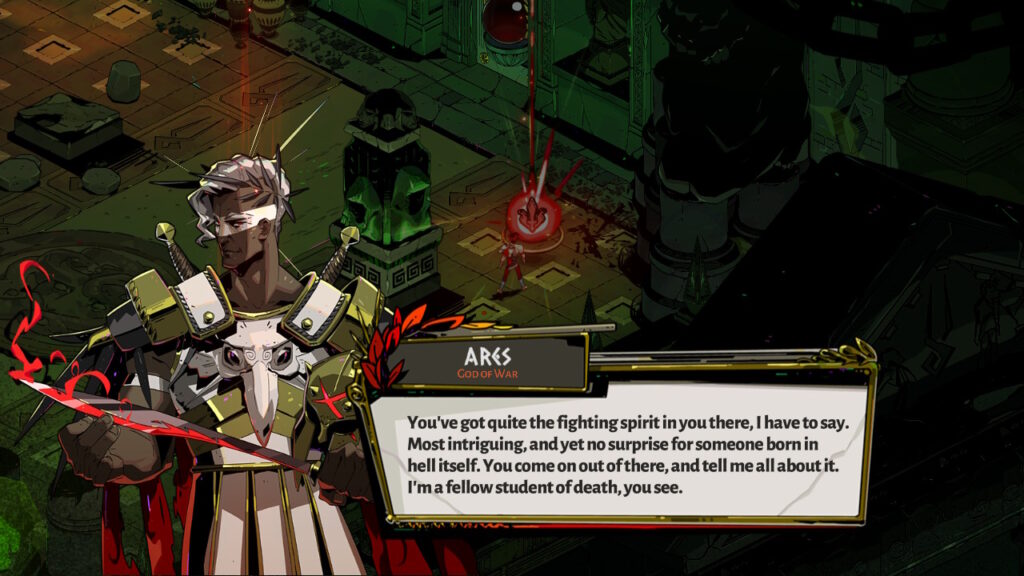
Being resurrected does not mean starting at zero. Zagreus loses all the abilities granted by the Gods, but he does get to keep all his different currencies (with the exception of the gold coins for Chiron’s shop). All the denominations are a bit much to keep track at first, but their utility is also to trade them for other currencies that may be more useful at any given moment.
Keys will unlock weapons and expand Zagreus’ core abilities, which is extremely important if he hopes to have more chances after death or make his casting more useful. Gems and diamonds can be spent to make Hades’ dominion have more opportunities to make it slightly easier; or if you really just want to change the drapes in the hall.
Some currencies are extremely rare and potent, like titan’s blood. It is only earned from defeating bosses, and can permanently upgrade any of the infernal arms. Being able to trade in other currencies for titan’s blood is an option that sometimes is available. No matter what, it always feels like there is something to work towards, and you always make progress.
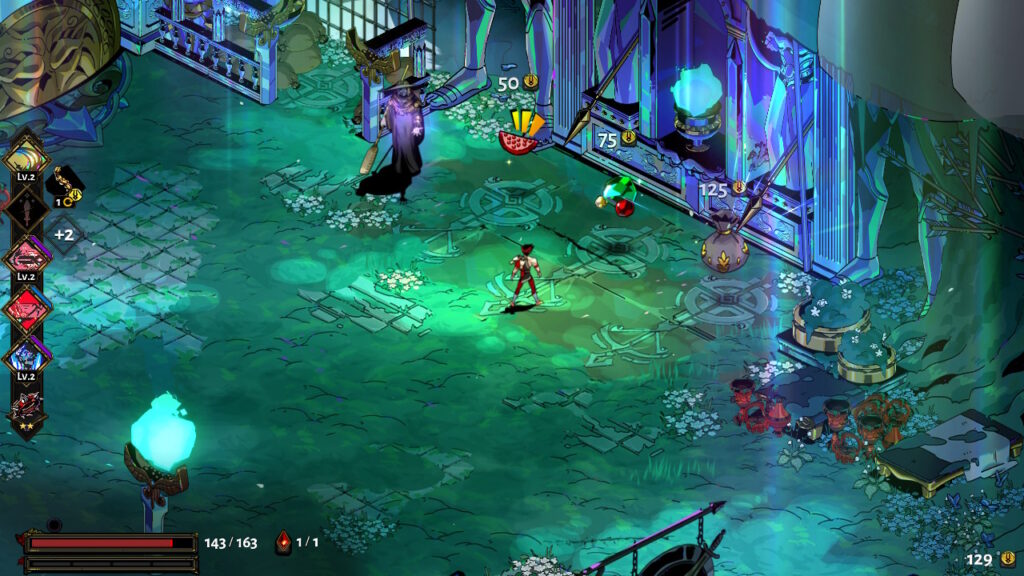
Every battle ends with a goodie and maybe Zagreus will live longer, just enough to make it to the next surprise. The cycle is highly stimulating, and you’ll almost never hear repeated dialogue phrases. Gods and other characters you meet along the way almost always have something to say to advance the narrative.
Even when Zagreus resurrects, Hades and the rest of the underworld denizens will have some unique dialogue exchanges almost every time. Once in a while there might be conversations with other characters, and if you have any nectar, gifting it to them will come with its own bespoke rewards.
Hades is a game where everything is constantly changing, and never settles into a tired and repetitions routine. Every experience feels unique, and given the randomized nature of the game, it is very possible to miss a lot of scenes or see some others may not. Resurrecting a lot will show many events transpire that a skilled player may never see.
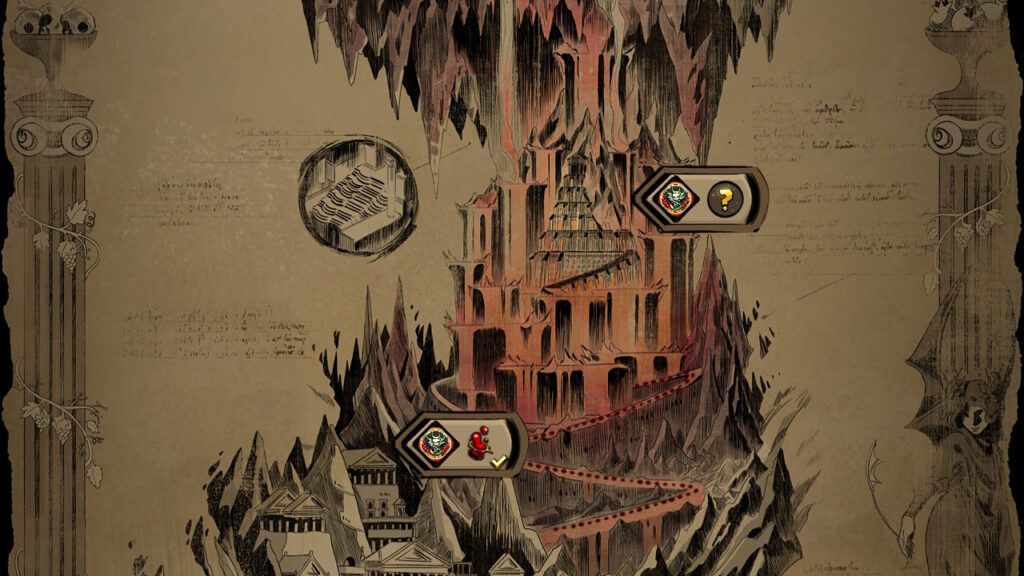
Like always, Supergiant Games’ visuals are sublime and lush with color. Jen Zee has been a fixture at the studio since Bastion. It is because of her craft and style that the games she works on have made an impact. Thankfully, Hades is an example where the substance of the gameplay can match her deft artistry.
One glimpse at every mythic figure, and you’ll know exactly who they are supposed to represent. Everyone’s personality is worn on their sleeve, and is heightened by great vocal performances. Zagreus’ voice actor especially embodies the character’s fun-loving yet suave guy traits you might see if Dante (from the Devil May Cry series) had an English accent.
Combined with their designs and voice actors, a lot of the Gods and heroes are dripping with sexual energy. It is a very fitting choice, given the historical context of the Greek myths and where they came from. You can feel the sexuality charging every scene, despite the game having barely anything explicit or overt in it.
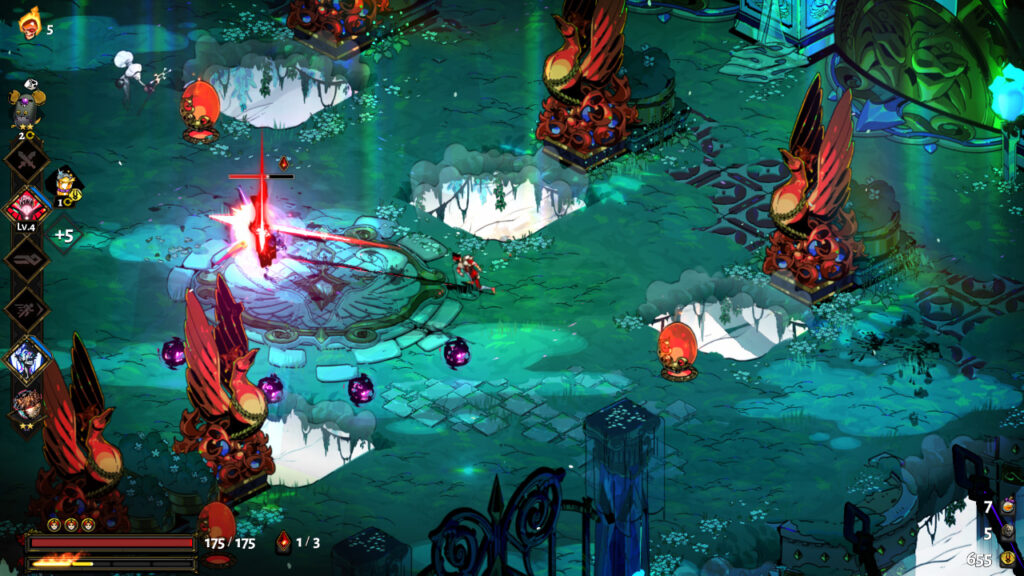
Every enemy and boss has a distinct silhouette and animation that makes them easy to read, even when you think you are blinded by a curtain of bullets. The sound design, mixed with defined wind-up motions, feel very natural and easy to react to. There is a satisfying and visceral bite to getting hit and delivering blows thanks to how crunchy the sound effects are.
The beautifully rendered 2D backdrops feel lively. Details like towering statues and wandering spirits roaming the backgrounds add a lot of flair to what are effectively empty rooms. Areas also come equipped with hazards, traps, and plenty of breakable vases.
The landscapes seem vast despite them only being a drawing. Progressing higher and higher with each zone is like a language of color that is telling a story. The underworld may be eternal torment, but at least it comes with a great view.
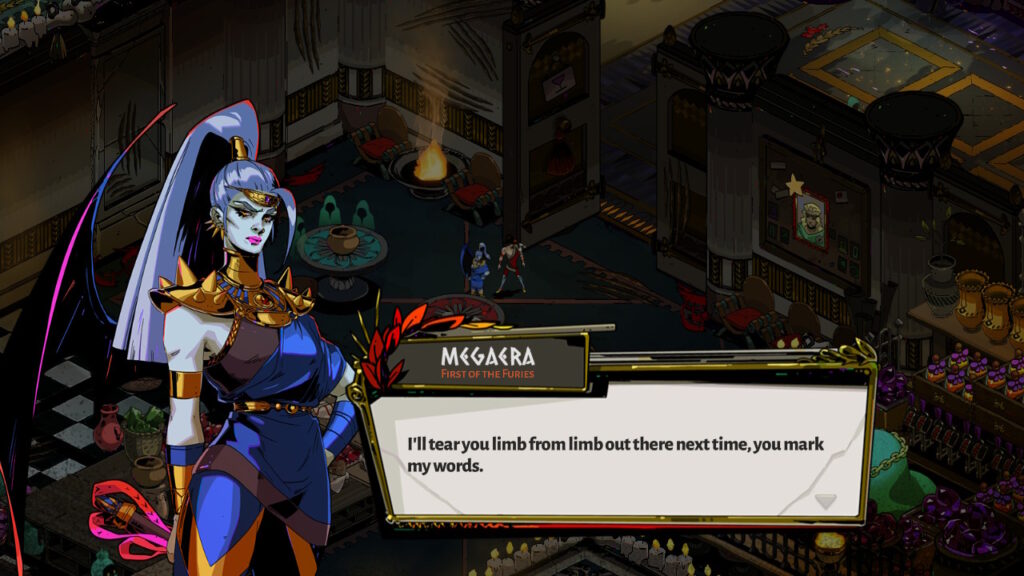
What isn’t pretty is how annoying some boss battles become after so many cycles. The issue is not having to re-fight them, but that they all have phases where they are granted immunity. The bosses already have a lot of health, and can make short work of Zagreus if the player isn’t paying attention.
The extra invincibility phases that occur in these fights drag out the experience and undermine any skill and upgrades the player has earned. The battle with the hydra is a good example of this, since he gets two invincibility phases and only becomes vulnerable after dispatching his extra heads.
It is challenging enough to have this creature blowing fireballs all over the field from about six heads and is able to spawn basic enemies onto the field. Giving bosses invincibility seems like a developer’s crutch to artificially lengthen a battle. This is emphasized by the fact that bosses also power-up after beating them several times.
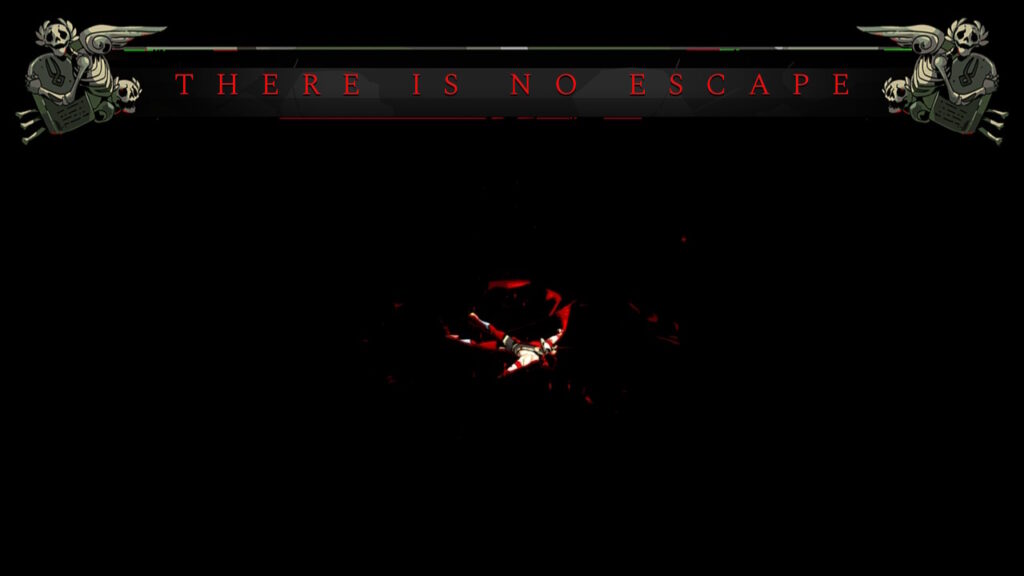
Hades‘ soundtrack is an eclectic fusion of tribal and rock. Music during bosses are especially intense, and carry an apocalyptic weight with the increasingly aggressive electric guitar shredding and rhythmic drums. Ambiance can go from spicy to relaxed, as some areas have a light and airy harpsichord riff. Ornate and rich, Hades looks how it sounds.
The endgame content is where Hades goes from being a great game, to being a masterpiece. This is also where much of the emotional weight for the characters develops, and the developers show their hand at what the game is actually about.
Zagreus grows during his endless escapes. He was already an obscure deity in the pantheon of Greek Gods, but this story is the first time anyone ever tried to give him a legend of his own. As a character, Hades is also given a lot of character development. In the beginning he seems like a stubborn and mocking jerk, but by the end you’ll realize he has a reason why he’s like that.
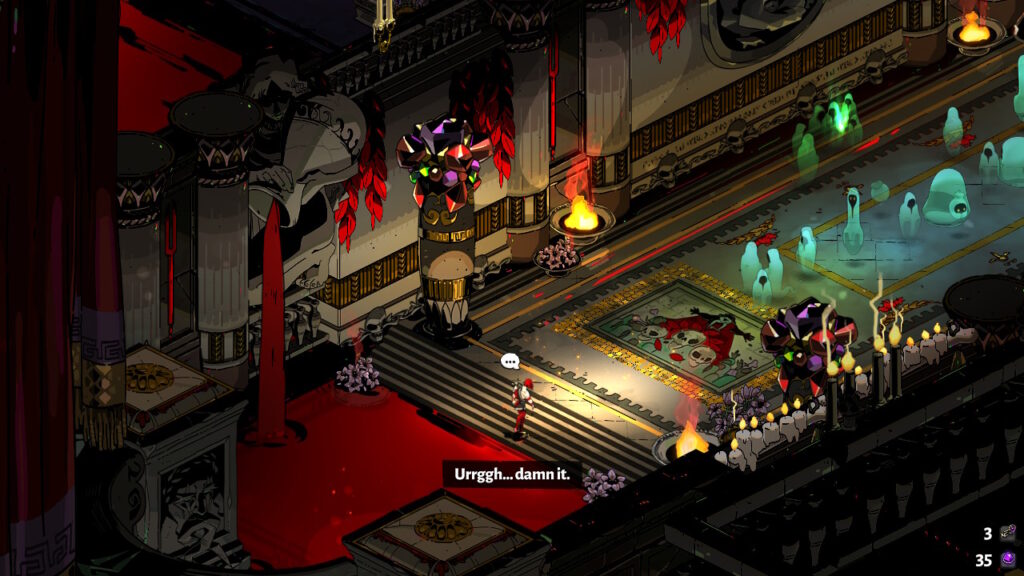
Hades is Supergiant Games’ magnum opus. The team finally crafted a brilliant gameplay system that can meet Jen Zee’s magnificent art. The constant flow of features and content keeps the game from ever getting stale or complacent. There is never a dull moment, and there is always something new to see.
Hardly anybody knew who Zagreus was, but Hades has created a legend for the figure that is very hard to top. This may become the definitive characterization of the myth for years to come. Now when anyone discusses Greek Gods, this game will certainly almost always be mentioned.
This is easily one of the better games released on Switch in 2020. There is a little something for everybody. Greek myth lore enthusiasts will get a kick out of it. RPG fans will enjoy the character-building mechanics, and even the action will satiate adrenaline junkies.
Hades was reviewed on Nintendo Switch using a code purchased by Niche Gamer. You can find additional information about Niche Gamer’s review/ethics policy here.